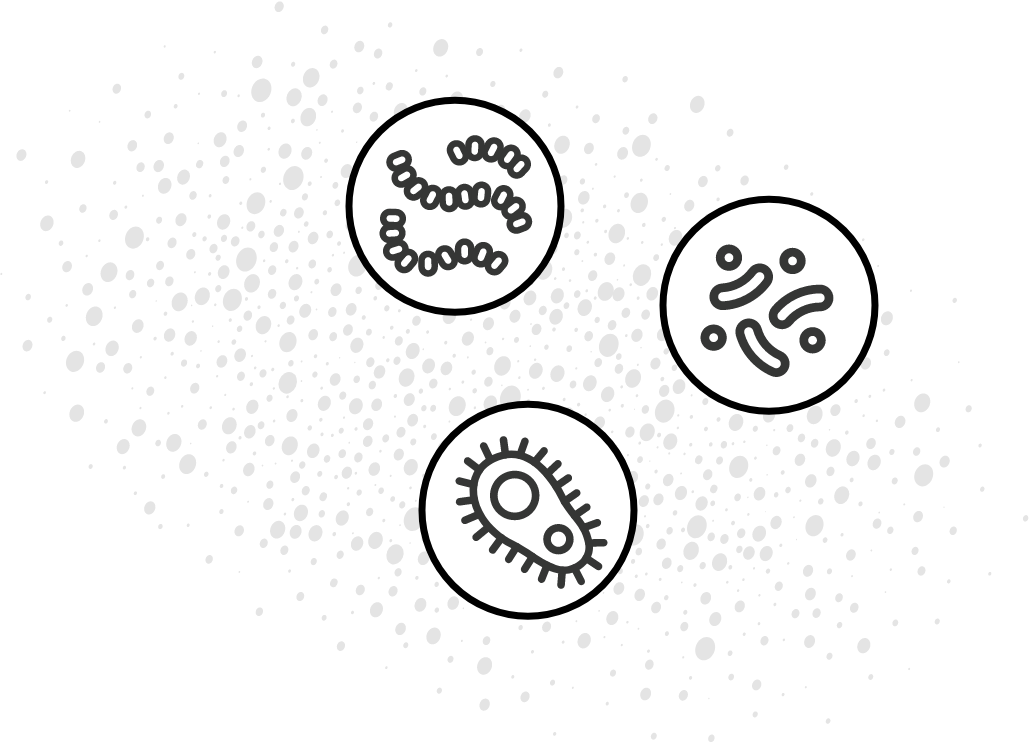Let's get started with the basics.
2 to 3
million
What are
vaccinations?
Vaccines are products that protect people against serious and potentially deadly preventable diseases. Once introduced in the body, vaccines stimulate a person’s immune system to produce immunity to a specific disease. Vaccines are usually given by injection (needle), but can also be given by mouth or sprayed into the nose. If a vaccinated person comes into contact with that disease in the future, their immune system will recognize it and quickly produce the antibodies needed to fight it.
For more information on the basics, click here.
Who needs vaccines?
Infants need vaccines
Vaccinating your child is one of the most important things you can do to protect their health. When a mother has been vaccinated, a newborn baby can acquire immunity against that particular vaccine-preventable disease. However, this “passive immunity” lasts only for a few weeks or months. Infants and young children are particularly vulnerable to vaccine-preventable diseases because their immune systems are less developed and less able to fight off infection. Vaccines offer long-lasting immunity. so your child develops their own immunity to these diseases as they grow. Keeping them on schedule is important to protect them from disease.
For specific vaccine information for infants and young children, click here.
To download a comprehensive parents’ guide to childhood vaccinations, click here.
To consider the risks and responsibilities of rejecting or delaying vaccinations, click here.
School-aged children and teens need vaccines.
Several vaccines are recommended for school-age children and teens. As children get older, they are at risk for new and different vaccine-preventable diseases. Also, some vaccines they received at a younger age can wear off, so booster doses are needed to provide continued protection.
For specific vaccine information for school-aged children and teens, click here.
Adults need vaccines
Vaccines remain important as we age. For example, each year in the United States, 1 million people get shingles. Some will have severe pain that can continue long after their rash clears up (called post-herpetic neuralgia). Some vaccines, like tetanus, are routinely recommended for all adults. Others may be recommended based on age, occupation, lifestyle, health conditions or travel. It’s important to stay on top of vaccinations.
For specific vaccine information for adults, click here.
For specific vaccine information for pregnant women, click here.
Exceptions to vaccines
The only people who should consider not getting or delaying certain vaccines are those with specific allergies or certain health conditions.
For more information on specific vaccines and who should not get them, click here.
14
The number of vaccine-preventable diseases you can protect your child from before the age of two.
Source: World Health Organization
19,000
The number of adults who die each year from pneumococcal pneumonia, for which we have a vaccine.
Source: World Health Organization
Vaccines do a lot of good.

What diseases can vaccines prevent?
We have the ability to prevent 17 diseases with vaccines! Chickenpox ● Diphtheria ● Flu ● Hepatitis A ● Hepatitis B ● Haemophilus influenzae type b (Hib) ● Human Papillomavirus ● Measles ● Mumps ● Pneumonia ● Polio ● Rotavirus Rubella ● Shingles ● Tetanus ● Whooping Cough
Some diseases that are prevented by vaccines, like whooping cough and chickenpox, remain common in the United States. Other diseases are no longer common in this country due to the success of vaccines. However, if we stopped vaccinating, even the few cases we have in the United States could very quickly lead to tens or hundreds of thousands of cases. In fact, in 2019, the U.S. saw the most cases reported.since 1992 and since measles was declared eliminated in 2000. Take note: It is far preferable to prevent a disease than to treat it after it occurs.
To learn more about all of the diseases that vaccines prevent, click here.
Other benefits of vaccinations
By vaccinating, we are protecting ourselves and the people around us.
When enough people in a community have immunity from a disease, that also helps protect people who are too sick or too young to be vaccinated. We have achieved “community immunity” for many vaccine-preventable diseases in the United States. This makes spreading a vaccine-preventable disease from person to person unlikely. Community immunity is only possible if people keep getting vaccinated.
What if we stopped vaccinating? Diseases that are almost non-existent today would likely stage a comeback. Before long, we would see epidemic levels of these diseases. Not only would more of our children get sick, but more would die.
We don’t vaccinate just to protect our children. We also vaccinate to protect our grandchildren and their grandchildren. We vaccinate to protect our future. We successfully eradicated smallpox through vaccination. As a result, our children don’t have to get smallpox vaccines anymore because the disease itself no longer exists. Smallpox is now only a memory, and if we keep vaccinating against other vaccine-preventable diseases, the same will someday be true for them. Vaccinations are one of the best ways to put an end to the serious risks of certain diseases.
For more information about why we vaccinate, click here.
HERD IMMUNITY AT WORK

Are there risks to vaccinating?
Like any medication, vaccines can cause side effects. For the most part, side effects are minor, such as a low-grade fever or a sore injection site, and typically go away within a few days. Serious side effects, such as severe allergic reactions, are extremely rare, and doctors and clinic staff are trained to deal with these rare events. The risk of exposing ourselves or our children, especially our infants, to side effects is intimidating, but the possible side effects of vaccination are far less dangerous than the significant risk of not vaccinating.

How do I know vaccinations are safe?
In the United States, a vaccine cannot make it into your doctor’s office without being proven significantly safe and highly effective. The journey of a vaccine onto the recommended immunization schedule goes through three specific phases of Food and Drug Administration (FDA) clinical trials. It takes years of testing and safety monitoring before a vaccine is licensed for use in the U.S.
Once an FDA-licensed vaccine is approved for use, and for as long as the vaccine is given, its safety is continuously monitored by the FDA and CDC (Centers for Disease Control and Prevention). As much as we study a vaccine before its release, there are rare occasions where its release into the greater public reveals new data. Vaccine recommendations may change if ongoing safety monitoring reveals new information on significant vaccine risks.
For more information about vaccine safety research, click here.